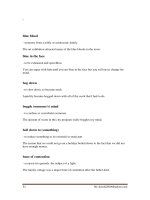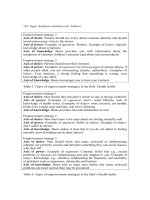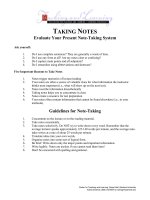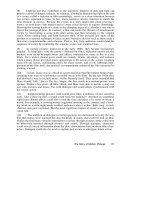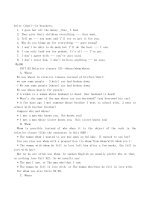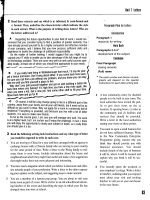Medical English phần 6 ppsx
Bạn đang xem bản rút gọn của tài liệu. Xem và tải ngay bản đầy đủ của tài liệu tại đây (655.32 KB, 20 trang )
Do remember to follow these tips:
· Good morning: from starting time to 12:00.
· Good afternoon: from 12:01 onwards, even though our metabolism is far
from feeling afternoon-ish and is begging us to say ªgood morningº.
· Good evening: from 18:00 onwards. Note that if we have to give a presenta-
tion, make a speech or offer a toast at 22:00, we should never begin with
ªgood nightº; that should be reserved only for when we are going to bed.
When giving a presentation, there is always a time limit. I understand, and
have actually experienced myself, how difficult it is to cram all we have to
say about the topic which we have been researching over the last few years
into a mere 20 minutes. In view of this time constraint, there are various
alternatives ranging from speaking as fast as the tongue can rattle, to cut-
ting it down to 5 minutes and spending the other 15 minutes vacantly gaz-
ing at the audience. American, British and Australian physicians are often
extremely fluent speakers (we know, we know . they are using their
mother tongue). However, remember that showing and commenting on five
slides a minute and speaking faster than can be registered on a digital re-
corder might not be the best way of conveying a message.
· Don't speak too fast or too slowly.
· Do summarize your presentation and rehearse to see how long you need
for clear delivery.
Sometimes lecturers tend to give too much data and minor details in their
presentations. Their introduction is often full of information that is of little
relevance for the international audience (for example, the name, date and
code of local, provincial, regional and national laws regulating health-care
standards in his/her institution; or even the background information on
the main researchers of a trial including their graduation year and shoe
size or a full history of the 16th Century building where the hospital
stands today and subsequent restorations it has undergone; etc). In these
cases, by the time all these details have been given and the presentation
has passed the introduction stage, time is up and the chairperson starts
making desperate signs to the speaker.
· Do structure your presentation so that you convey a few clear messages
instead of a huge amount of not-so-relevant information which nobody
has a chance to take in.
· Don't read from a script, but instead try to explain a few basic ideas as
clearly as possible. Many intermediate English-speaking doctors could
not agree with this point because they can only feel some confidence if
they read the presentation. Reading is the least-natural means of com-
municating experiences; we encourage you to present your paper with-
out reading it. Although it will need much more intensive preparation,
the delivery will be more fluid and ± why not? ± even brilliant. Many
Unit IV Talks and Courses
98
foreign doctors resign themselves to delivering just acceptable talks and
explicitly reject the possibility of making a presentation at the same level
as in their own language. Do not reject the possibility of being as brilli-
ant as you would be in your own language; the only difference consists
in rehearsing. Thorough rehearsal can provide you with amazing results;
do not give up beforehand.
Enjoy yourself. When giving the presentation relax; nobody knows more
than you do about the specific subject that you are presenting. The only
way to make people enjoy your presentation is by enjoying it yourself. You
only have to communicate, not to perform; being a good researcher or a
competent clinician is not the same thing as being a stand-up comedian or
a model. This does not mean that we can afford to overlook our presenta-
tion skills, especially if you want most of your colleagues to still be awake
at the end of your presentation!
· Do try to overcome stage fright and focus on communicating. There
must be somebody out there interested in what you have to say . . . either
to praise it or to tear it to pieces, but that doesn't matter.
· Do avoid anything that would make you nervous when giving your pre-
sentation. One piece of advice is to remove all keys, coins or other metal
objects from your pockets so that you are not tempted to rattle them
around ± a truly irritating noise that we have all learned to hate.
Humor . what can we say about humor? We all know that humor is a very
cultural thing, like timekeeping, ties, food preferences, etc. Almost all
American speakers will start their presentation with a joke that most Euro-
peans will not understand, not even the Irish or British. A British speaker
will probably throw in the most sarcastic comment when you are least ex-
pecting it and in the same tone as if he or she were telling you about the
mortality rate in his or her unit. A foreign (neither American nor British)
doctor might just try to tell a long joke in English based on a play on
words in his or her mother tongue which obviously doesn't work in Eng-
lish and possibly involves religion, football and/or sex (as a general rule
avoid religious and sex jokes in public presentations).
· Do make sure that your jokes can be understood internationally. Creativ-
ity and humor are always appreciated in a lecture hall . providing they
are both appropriate and understood!
Chairing a Session
Chairing sessions at international meetings usually comes up when you
have reached a certain level in your academic career. To reach this point
many papers will have been submitted and many presentations will have
Giving a Talk
99
been given, so the chances are your medical English level will be above
that of the target audience of this manual.
Why, then, do we include a section on chairing a session?
We include it because contrary to what many of those who have never
chaired a session in an international meeting may think, even an experi-
enced chairperson might face difficult, even embarrassing situations.
For those who have never chaired a session, to be a chairman means,
firstly, not having to prepare a presentation, and, secondly, the use of sim-
ple sentences such as ªthank you, Dr. Vida, for your interesting presenta-
tionº or ªthe next speaker will be Dr. Jones who comes from . º.
In our opinion, being a chairperson means much more than those who
have never chaired them might think. To begin with, a chairperson must
go over not one presentation but thoroughly study all the recently pub-
lished material on the discussed subject. On top of that, a chairperson
must review all the abstracts and must have prepared questions just in case
the audience has no questions or comments.
We have divided this section into three subsections:
1. Usual chairperson's comments.
2. Should chairpersons ask questions?
3. What the chairperson should say when something is going wrong.
Usual Chairperson's Comments
Everybody who has attended an international meeting is aware of the usual
sentences the chairperson uses to introduce the session. Certain key ex-
pressions will provide you with a sense of fluency without which chairing
a session would be troublesome. The good news is that if you know the
key sentences and use them appropriately, chairing a session is easy. The
bad news is that if, on the contrary, you do not know these expressions, a
theoretically simple task will become an embarrassing situation.
Introducing the Session
We suggest the following useful comments for introducing the session:
· Good morning ladies and gentlemen. My name is Dr. Vida and I want
to welcome you all to this workshop on congenital heart disease. My co-
chair is Dr. Vick who comes from King's College.
· Good afternoon. The session on cardiomyopathies is about to start.
Please take a seat and disconnect your cellular phones and any other
electrical devices which could interfere with the oral presentations. We
will listen to ten 6-minute lectures with a 2-minute period for questions
and comments after each of them, and afterwards, provided we are still
on time, we will have a last round of questions and comments from the
audience, speakers and panelists.
Unit IV Talks and Courses
100
· Good morning. We will proceed with the session on fibroid emboliza-
tion. As many papers have to be delivered I encourage the speakers to
keep an eye on the time.
Introducing Speakers
We suggest the following useful comments for introducing speakers:
· Our first speaker is Dr. Vida from Reina Sofia Hospital in Cordoba, Spain,
who will present the paper: ªMR evaluation of focal splenic lesionsº.
The following speakers are introduced almost the same way with sentences
such as:
· Our next lecturer is Dr. Adams. Dr. Adams comes from Brigham and
Women's Hospital. Harvard Medical School, and his presentation is en-
titled ªDiagnosis and treatment of hemangiopericytomaº.
· Next is Dr. Shaw from Beth Israel Deaconess Hospital, presenting ªSur-
gical treatment of insulinomasº.
· Dr. Olsen from UCSF is the next and last speaker. His presentation is:
ªMetastatic disease. Pathways to the heartº.
Once the speakers finish their presentation, the chairperson is supposed to
say something like:
· Thank you Dr. Vida for your excellent presentation. Any questions or
comments?
The chairperson usually comments on presentations, although sometimes
they do not do it:
· Thank you Dr. Vida for your presentation. Are there any questions or
comments from the audience?
There are some common adjectives (nice, elegant, outstanding, excellent,
interesting, clear, accurate . ) and formulas that are usually used to de-
scribe presentations. These are illustrated in the following comments:
· Thanks Dr. Shaw for your accurate presentation. Does the audience have
any comments?
· Thank you very much for your clear presentation on this always contro-
versial topic. I would like to ask a question. May I? (Although being the
chairperson you are the one who gives permission, to ask the speaker is
a usual formality.)
· I'd like to thank you for this excellent talk Dr. Olsen. Any questions?
· Thanks a lot for your talk Dr. Ho. I wonder if the audience has got any
questions?
Giving a Talk
101
There is always a first time for everything, and if it is the first time you
have been invited to chair a session, rehearse some of the sentences above
and you will feel quite comfortable. Accept this piece of advice: only ªre-
hearsed spontaneityº looks spontaneous if you are a beginner.
Adjourning
We suggest the following useful comments for adjourning the session:
· I think we all are a bit tired so we'll have a short break.
· The session is adjourned until 4 pm.
· We'll take a short break.
· We'll take a 30 minute break. Please fill out the evaluation forms.
· The session is adjourned until tomorrow morning. Enjoy your stay in
San Francisco.
Finishing the Session
We suggest the following useful comments for finishing the session:
· I'd like to thank all the speakers and the audience for your interesting
presentations and comments. (I'll) see you all at the congress dinner
and awards ceremony.
· The session is over. I want to thank all the participants for their contri-
bution. (I'll) see you tomorrow morning. Remember to take your atten-
dance certificates if you have not taken them already.
· We should finish up over here. We'll resume at 10:50.
Should Chairpersons Ask Questions?
In our opinion, chairpersons are supposed to ask questions especially at
the beginning of the session when the audience does not usually make any
comments at all. Warming-up the session is one of the chairperson's duties
and if nobody in the audience is in the mood to ask questions the chair-
person must invite the audience to participate:
· Are there any questions?
Nobody raises their hand:
· Well, I have got two questions for Dr. Adams: Do you think MR is the
imaging method of choice for the detection and characterization of focal
splenic lesions? and second: What should be, in your opinion, the role of
CT and ultrasound in this diagnostic algorithm?
Once the session has been warmed-up, the chairperson should only ask
questions or add comments as a tool to manage the timing of the session,
so that, if as usual, the session is behind schedule, the chairperson is not
required to participate unless strictly necessary.
Unit IV Talks and Courses
102
The chairperson does not have to demonstrate to the audience his or
her knowledge on the discussed topics by asking too many questions or
making comments. The chairperson's knowledge of the subject is not in
doubt since without it he or she would not have been selected to chair.
What the Chairperson Should Say when Something is Going Wrong
Behind Schedule
Many lecturers, knowing beforehand they have a certain amount of time to
deliver their presentations, try to talk a little bit more stealing time from
the questions/comments time and from later speakers. Chairpersons should
cut short this tendency at the very first chance:
· Dr. Berlusconi, your time is almost over. You have got 30 seconds to fin-
ish your presentation.
· Dr. Ho, you are running out of time.
If the speaker does not finish his presentation on time, the chairperson
may say:
· Dr. Berlusconi, I'm sorry but your time is over. We must proceed to the
next presentation. Any questions, comments?
After introducing the next speaker, sentences like the following ones will
help you to handle the session:
· Dr. Goyen, please keep an eye on the time, we are behind schedule.
· We are far from being ahead of schedule, so I remind all speakers you
have 6 minutes to deliver your presentations.
Ahead of Schedule
Although unusual, sometimes there is some extra time and this is a good
chance to ask the panelists a general question about their experience at
their respective institutions:
· As we are a little bit ahead of schedule, I encourage the panelists and
the audience to make questions and comments.
· I have got a question for the panelists: What percentage of the total
number of CMRs at your institution are performed on children?
Technical Problems
Computer Not Working
We suggest the following comments:
· I am afraid there is a technical problem with the computer. In the mean-
time I would like to make a comment about .
· The computer is not working properly. While it is being fixed I encour-
age the panelists to make their always interesting comments.
Giving a Talk
103
Lights Gone Off
We suggest the following comments:
· The lights have gone off. We'll make a hopefully short stop until it is re-
paired.
· As you see, or better, do not see at all, the lights have gone off. The hotel
staff have told us it is going to be a matter of minutes so do not go too
far; we'll resume as soon as possible.
Sound Gone Off
We suggest the following comments:
· Dr. Hoffman, we cannot hear you. There must be a problem with your
microphone.
· Would you try this other microphone?
· Would you please use the microphone, the rows at the back cannot hear
you.
Lecturer Lacks Confidence
If the lecturer is speaking too quietly:
· Dr. Smith would you please speak up? The audience cannot hear you.
· Dr. Alvarez would you please speak up a bit? The people at the back
cannot hear you.
If the lecturer is so nervous he/she cannot go on delivering the presenta-
tion:
· Dr. Olson, take your time. We can proceed to the next presentation, so
whenever you feel OK and ready to deliver yours, it will be a pleasure to
listen to it.
Unit IV Talks and Courses
104
UNIT V
What Can Go Wrong . Nightmares That Don't Come True
What? A section on nightmares? As in bad dreams that make you wake up
in the middle of the night? Or a section on things that could go wrong in
life, i.e., buying a used car on the black market? Or both? Or neither?
We could just hear the reader mumbling these questions when scanning
through the table of contents just as his/her finger hovers over this title.
Yes, this is indeed a section only for the brave, only for those who have ac-
tually made it all the way here to this page, to face the jungle out there.
The jungle being the challenge of preparing and delivering a presentation
in English when one is just a simple mortal.
We have decided to write about this topic because we ourselves used to
be the ones with nightmares. There were so many things that could go
wrong when dealing with medical terminology in English, that the mathe-
matical concept of infinity seemed ridiculously small.
In this section we try and share with you what we have found to be some of
the great hurdles in medical English. There are many things that certainly can
go wrong when one is asked to give a lecture in English. This is by no means
an exhaustive account from a comprehensive risk assessment study. Rather it
is just a way of passing on what we have learnt from our own experience in
the fascinating world of international medical conferences.
As mentioned before in this book, many doctors did not have a lucky
day when Mother Nature handed out predisposing factors for success at
giving presentations in English. Firstly, they did not live in a country where
English is part of day-to-day life. Secondly, they were never taught lan-
guages properly at school.
When preparing and actually delivering a presentation in English at an
international medical conference, a series of basic issues should be taken
into account. We have grouped them into three danger zones, in the hope
that their classification will make them shrink or at least become less of a
problem. The categories are the following:
1. English grammar: they all say it's so simple and yet nobody gets it
right.
2. Misnomers and false friends.
3. Common basic mistakes.
Unit V Some of the Most Frequent
Mistakes Made by Doctors
Speaking in English
English Grammar
Each nationality has its own black spots. Inevitably all speakers gain their own
reputation too, in this cruel world of ours. The problem is that when you start
learning English, there are all these big smiles telling you: ªOn the one hand
pronunciation is difficult but on the other hand grammar is so easy.º
Well, here is where it all begins: yes, English grammar is simple, true.
The problem is that English is a language with very strict rules for word
order, use of prepositions, etc. There is not as much room for improvisa-
tion when it comes to making up a sentence. Each verb is to be followed
by one and only one preposition, otherwise it would mean something not
only entirely, but also embarrassingly, different:
· Thank you very much for putting me up for the night (letting me stay).
· Thank you for putting up with me for the night (tolerate my presence).
In short, when speaking in English, a foreigner has to make a conscious ef-
fort to remember the cast-iron rules and avoid creating his/her own spur-
of-the-moment version of the sentence structure.
Where do we always fail then? There are certain grammatical rules that
tend to be overlooked by lecturers. Here you will find some examples of
how to avoid frequently made mistakes:
· Never use the article the when the noun refers to something generic:
± Peak concentration of the drug was measured on (the) day 28.
± Smoking is undoubtedly a (the) risk factor.
· There are certain verbs that always need a specific preposition:
± We listen to our patients.
±Puton your coat and attend to the next patient.
± Could you please explain to me how the accident happened.
· There are certain verbs that will never ever take a preposition:
±Youmust take this tablet once a day.
± If I were you I would attend the meeting.
· English structure is usually simpler than the grammar of your mother
tongue. So, when speaking English, think in terms of: subject (S) + verb
(V) + object (O):
± The diagnosis (S) was (V) pneumonia (O).
The list of examples could be much longer. We do not intend this to be an
exhaustive list; on the contrary, we encourage you with the help of Unit II
and grammar manuals to find out your personal danger zones and create
your personal grammar checklist.
Our advice is that whenever you are to give a talk in English, make sure
a native English speaker, preferably a doctor, listens to you. Only such a lis-
tener will spot those sometimes silly and sometimes subtle grammatical
mistakes that we always make and seem to follow us wherever we go. The
Unit V Some of the Most Frequent Mistakes Made by Doctors Speaking in English
108
rehearsal of your lecture before your native English speaker will always
add value and spontaneity to your presentation.
Misnomers and False Friends
Every tongue has its own false friends. A thorough review of false friends
is beyond the scope of this manual and we suggest that you look for those
tricky names that sound similar in your language and in English but have
completely different meanings.
Think, for example, about the term graft versus host disease. The transla-
tion of host has not been correct in some romance languages, and in Spanish
the term host, which in this context means recipient, has been translated as
husped which means person staying in another's house. Many Spanish med-
ical students have problems with the understanding of this disease because of
the terminology used. Taking into account that what actually happens is that
the graft reacts against the recipient, if the disease had been named graft ver-
sus recipient disease, the concept would probably be more precisely conveyed.
So from now on, identify false friends in your own language and make a
list beginning with those belonging to your specialty; there is no use in
knowing false friends in a language different from yours.
Medicine is full of misnomers. Think for a moment about the term
superficial femoral vein. It is difficult to explain how a superficial femoral
vein clot is actually in the deep venous system.
Many radiologists and oncologists all over the world say normal medias-
tinal lymphadenopathy. Lymphadenopathy means, from an etymological
point of view, abnormal lymph node. A normal lymphadenopathy is as ab-
surd as a normal psychopathy.
Etymologically pancreas means all meat, but there is no muscle at all in
that endocrine and exocrine gland.
Etymologically azygos means odd which puts hemiazygos in a strange sit-
uation taking into consideration that odd numbers are not divisible by two.
The term innominate vein is as absurd as naming a baby unnamed.
When talking about false friends, very often we find that the real prob-
lem is the pronunciation. So we think it is just about time to get down to
talking about one of our most dreaded nightmares: English phonetics. This
is just not made for us. We all agree we are facing a tricky business here
and, if given the choice, any physician in his/her right senses would prefer
to read 100 or even a 1000 pages of English text rather than face the chal-
lenge of a one-minute conversation in the same language. Many well-
trained professionals who have no speech impairment in their native ton-
gue and can read English and understand it, the minute they are asked a
very simple question in English, start shaking, frowning, stuttering, look-
ing upwards as if calling for help from above, and finally after a few min-
utes they eventually say: ªI don't know!º.
Misnomers and False Friends
109
We recommend that you should:
1. Not be afraid of sounding different or funny: English sounds are differ-
ent and funny.
2. Enjoy the effort of using a different set of muscles in the mouth. In the
beginning the ªEnglish musclesº may become stiff and even hurt, but
persevere, it's only a sign of hard work.
3. Not worry about having in the beginning a broad or even embarrassing
accent: it doesn't matter as long as you are understood. The idea is to
communicate, to say what you think or feel, and not to give a perfor-
mance in speech therapy.
4. Try to pronounce English words properly. As time goes by and you begin to
feel relatively confident about your English, we encourage you to progres-
sively and thoroughly study English phonetics. Bear in mind that if you keep
your pronunciation as it was at the beginning you will sound like American
or British people do when speaking with their unmistakable accent.
5. Rehearse standard collocations in both conversational and professional
scenarios. Saying straightforward things such as ªDo you know what I
mean?º or ªWould you do me a favor?º will provide you with extremely
useful fluency tools.
Having your own subtle national accent in English is not a serious problem
as long as the presentation conveys the correct message. However, as far as
pronunciation is concerned, there are several tricky words that cannot be
properly named false friends and need some extra attention:
In English there are some words that are spelt differently but sound very
much the same. Consider the following, for example:
· Ileum: the distal portion of the small intestine, extending from the jeju-
num to the cecum.
· Ilium: the uppermost and widest of the three sections of the hip bone.
Imagine for a moment how surrealist it would be for our surgeons to mix
up the bowel with the hip bone. Well, I suppose you could say it could be
worse ± at least both anatomical structures are roughly in the same area!
Again, consider the following:
The English word tear means two different things according to how we
pronounce it:
· If tear [tiar] is pronounced
1
, we mean the watery secretion of the lacry-
mal glands which serves to moisten the conjunctiva.
Unit V Some of the Most Frequent Mistakes Made by Doctors Speaking in English
110
1
For simplicity, the authors have taken the liberty of using an approximate repre-
sentation of the pronunciation instead of using the phonetic signs. Apologies pre-
sented to our linguist colleagues who may have preferred a more orthodox tran-
scription.
· If tear [tear] is pronounced, we are referring to the action of wounding
or injuring, especially by ripping apart.
Common Basic Mistakes
These are some of the most common mistakes made in presentations at in-
ternational congresses:
· 22-years-old man presenting .
· There was not biopsy of the lesion
· It allows to distinguish between . . .
· Hemorrhagic tumors can cause .
· The main group of myxoid tumors are
· Could you tell me how old is the patient?
· Most of the times hemangiomas .
· Looking forward to hear from you
· Best regards
· Are you suffering from paresthesias?
· There are multiple metastasis
22-years-old man presenting. Many times the first sentence of the first slide
of the presentation contains the first error. For those lecturers with an in-
termediate level this simple mistake is so evident that they barely believe it
is one of the most frequent mistakes ever made.
It is quite obvious that the adjective 22-year-old cannot be written in the
plural and it should be written:
· 22-year-old man presenting.
There was not biopsy of the lesion. This is a frequent and relatively subtle
mistake made by upper-intermediate speakers. If you still prefer the use of
the negative form you should say:
· There was not any biopsy of the lesion.
But the affirmative form is:
· There was no biopsy of the lesion.
It allows to distinguish between. Two alternative sentences can be chosen:
· It allows us to distinguish between.
or
· It allows the distinction between.
Haemorrhagic tumors can cause. Check your paper or presentation in order
to avoid inconsistency in terms of American and British English.
Common Basic Mistakes
111
This example shows a sentence made up of an American English word
(tumors) and a British English word (haemorrhagic). So choose American
or British spelling depending on the journal or congress you are sending
your paper to.
Therefore, the sentence should read:
· Haemorrhagic tumours can cause.
or
· Hemorrhagic tumors can cause.
The main group of myxoid tumors are. Although extremely simple, this is one
of the most frequent mistakes found in published medical papers.
Do not ever forget that in this kind of sentence, noun phrases are always
in the singular and must be followed by the verb in the third person singu-
lar.
Noun phrase-verb lack of congruency is more likely to appear in long
sentences, so try to avoid such sentences and when they are used check
and double-check them carefully.
As everybody knows, but many forget in papers, the sentence should be:
· The main group of myxoid tumors is.
Could you tell me how old is the patient. Embedded questions are always
troublesome. Whenever a question is embedded in another interrogative
sentence its word order changes. This happens when, trying to be polite,
we incorrectly change What time is it? to Would you please tell me what
time is it? instead of to Would you please tell me what time it is?
In medicine, the direct question How old is the patient? must be trans-
formed to its embedded form as follows:
· Could you tell me how old the patient is?
Most of the times hemangiomas. You can say many times but not most of the
times. Most of the time is correct and you can use commonly or frequently
as equivalent terms. Say instead:
· Most of the time hemangiomas.
Looking forward to hear from you. This a very frequent mistake at the end
of formal letters such as those sent to editors. The mistake is based upon a
grammatical error. To may be either a part of the infinitive or a preposi-
tion. In this case to is not a part of the infinitive of the verb hear but a
part of the prepositional verb look forward; it is indeed a preposition.
There may be irreparable consequences of making this mistake. If you
are trying to have an article published in a prestigious magazine you can-
not make formal mistakes which can preclude the reading of your other-
wise interesting article.
Unit V Some of the Most Frequent Mistakes Made by Doctors Speaking in English
112
So instead of looking forward to hear from you, you should write:
· Looking forward to hearing from you.
Best regards. Although it is used in both academic and informal correspon-
dence best regards is a mixture of two strong English collocations: kind re-
gards and best wishes. In our opinion instead of best regards, which is col-
loquially acceptable, you should write:
· Kind regards
or simply
· Regards
Are you suffering from paresthesia? Many doctors forget that patients are not
colleagues and use medical terminology which cannot be understood by
them. This technical question would have been easily understood by say-
ing:
· Do you have pins and needles?
There are multiple metastasis. Whenever you use a Latin term check its sin-
gular and plural. Metastasis is singular whereas metastases is plural so that
there are multiple metastasis is not correct (see Unit VI). In this case, you
should write:
· There are multiple metastases.
Common Basic Mistakes
113
UNIT VI
Introduction
Latin and Greek terminology is another obstacle to be overcome on our
way to becoming fluent in medical English. Romance-language speakers
(Spanish, French, Italian . ) are undoubtedly at an advantage, although
this advantage in theory can become a great drawback in terms of pronun-
ciation and, particularly, in the use of the plural forms of Latin and Greek.
This unit is made up of a set of somewhat intuitive plural rules, several
exercises containing Latin and Greek terminology, and finally a double list
of Latin and Greek terms, the first one consisting of terms without English
equivalents and the second one made up of terms with English equivalents.
Plural Rules
It is obvious that it is far from our intention to replace medical diction-
aries and Latin or Greek text books. Conversely, this unit is aimed at giv-
ing some tips related to Latin and Greek terminology that can provide an
intuitive approach to this challenging topic.
Our first piece of advice on this subject is that whenever you write a La-
tin or Greek word, firstly, check its spelling and, secondly, if the word you
want to write is a plural one, never make it up. Although guessing the
plural form could be acceptable as an exercise in itself, double-check the
word by looking it up in a medical dictionary.
The following plural rules are useful to at least give us self-confidence in
the use of usual Latin or Greek terms such as metastasis ± metastases, pel-
vis ± pelves, bronchus ± bronchi, etc . . .
Some overseas doctors do think that metastasis and metastases are
equivalent terms, and they are absolutely wrong; the difference between a
unique liver metastasis and multiple liver metastases is so obvious that no
additional comments are needed.
There are many Latin and Greek words whose singular forms are almost
never used as well as Latin and Greek terms whose plural forms are sel-
dom said or written. Let us think, for example, about the singular form of
Unit VI Latin and Greek Terminology
viscera (viscus). Very few physicians are aware that liver is a viscus whereas
liver and spleen are viscera. From a colloquial standpoint this discussion
might be considered futile, but those who write papers do know that Lat-
in/Greek terminology is always a nightmare and needs thorough revision,
and that terms seldom used on a day-to-day basis have to be properly writ-
ten in a scientific article. Again, let us consider the plural form of pelvis
(pelves). To talk about several pelves is so rare that many doctors have
never wondered what the plural form of pelvis is.
Although there are some exceptions, the following intuitive rules can be
helpful with plural terms:
· Words ending in -us change to -i:
± Bronchus ± bronchi
· Words ending in -um change to -a:
± Acetabulum ± acetabula
· Words ending in -a change to -ae:
± Vena ± venae
· Words ending in -ma change to -mata or -mas:
± Sarcoma ± sarcomata/sarcomas
· Words ending in -is change to -es:
± Metastasis ± metastases
· Words ending in -is change to -ides:
± Arthritis ± arthritides
· Words ending in -x change to -ces:
± Pneumothorax ± pneumothoraces
· Words ending in -cyx change to -cyges:
± Coccyx ±
coccyges
· Words ending in -ion change to -ia:
± Criterion ± criteria
Exercises
These quite simple exercises have been created with the purpose of encour-
aging you to become familiar with Latin and Greek plurals. From now on
you should create your own exercises using your specialty's most common
Latin and Greek terms.
1. There are two mistakes in the next paragraph. Find them:
± The spleen is probably the least-studied abdominal viscera. Multiple
metastasis are relatively uncommon.
± (Viscus. Metastases)
2. Are there any mistakes in the next line?
± Each leg has two menisci.
±(No)
Unit VI Latin and Greek Terminology
118
3. Are there any mistakes in the next line?
± The patient's right knee had got lesions in its two meniscus.
± (Yes. Menisci instead of meniscus)
4. How many mistakes can you find in the next paragraph?
± Two thrombus were removed through mechanical aspiration. Al-
though a third thrombi was detected, it was not removed.
± (Two. Thrombi. Thrombus)
5. Is there any mistake in the next line?
± Two iliofemoral thromboses were identified.
±(No)
6. Write the plural form of cervix.
± (Cervices)
7. Identify the mistakes:
± Both superior and inferior veni cavi were occluded.
± (Venae cavae)
8. Is the following sentence correct?
± The only diagnostic criteria was fever.
± (No. Criterion)
9. Any mistakes here?
± Several metastasis were found in the liver.
± (Metastases)
10. Is this correct?
± Both humerus were shorter than normal.
± (Humeri)
List of Latin and Greek Terms and Their Plurals
A
· Acetabulum pl. Acetabula. Cotyle
· Acinus pl. Acini. Acinus
· Aditus pl. Aditus. Aditus (entrance to a cavity)
± Aditus ad antrum
± Aditus ad aqueductum cerebri
± Aditus ad infundibulum
± Aditus ad saccum peritonaei minorum
± Aditus glottidis inferior
· Agger pl. Aggeres. Agger (prominence)
± Agger nasi
± Agger perpendicularis
± Agger valvae venae
· Alveolus pl. Alveoli. Alveolus
· Alveus pl. Alvei. Alveus (canal or cavity)
· Amoeba pl. Amoebae. Ameba
· Ampulla pl. Ampullae. Ampoule
List of Latin and Greek Terms and Their Plurals
119
· Anastomosis pl. Anastomoses. Anastomosis
· Ansa pl. Ansae.Loop
· Antrum pl. Antra.Antrum
· Anus pl. Anus.Anus
· Aorta pl. Aortae. Aorta
· Apex pl. Apices. Apex
· Aphtha pl. Aphthae. Aphtha (small ulcer)
· Aponeurosis pl. Aponeuroses. Aponeurosis
· Apophysis pl. Apophyses. Apophysis
· Apparatus pl. Apparatus. Apparatus (system)
· Appendix pl. Appendices. Appendage
· Area pl. Areae. Area
· Areola pl. Areolae. Areola
· Arrector pl. Arrectores. Erector
· Arteria pl. Arteriae. Artery
· Arteriola pl. Arteriolae. Arteriola (small artery)
· Arthritis pl. Arthritides. Arthritis
· Articulatio pl. Articulationes.Joint
· Auricula pl. Auriculae. Auricula (ear flap)
· Auris pl. Aures. Auris (ear)
B
· Bacillus pl. Bacilli. Stick-shape bacterium
· Bacterium pl. Bacteria.Bacterium
· Borborygmus pl. Borborygmi. Borborygmus
(gastrointestinal sound related to the passage of gas)
· Brachium pl. Brachia.Arm
· Bronchium pl. Bronchia. Bronchus
· Bronchus pl. Bronchi. Bronchus
· Bulla pl. Bullae. Bulla
· Bursa pl. Bursae. Bursa (bag)
C
· Calcaneus pl. Calcanei. Calcaneus
· Calculus pl. Calculi. Stone
· Calix pl. Calices. Calix
· Calx pl. Calces. Heel
· Canalis pl. Canales. Canal
· Cancellus pl. Cancelli. Reticulum
· Cancrum pl. Cancra. Cancrum (gangrene)
± Cancrum nasi
· Capillus pl. Capilli. Hair
· Capitulum pl. Capitula. Condyle
· Caput pl. Capita. Head
· Carcinoma pl. Carcinomas (or Carcinomata). Carcinoma (cancer)
· Carina pl. Carinae. Carina (tracheal carina)
Unit VI Latin and Greek Terminology
120
